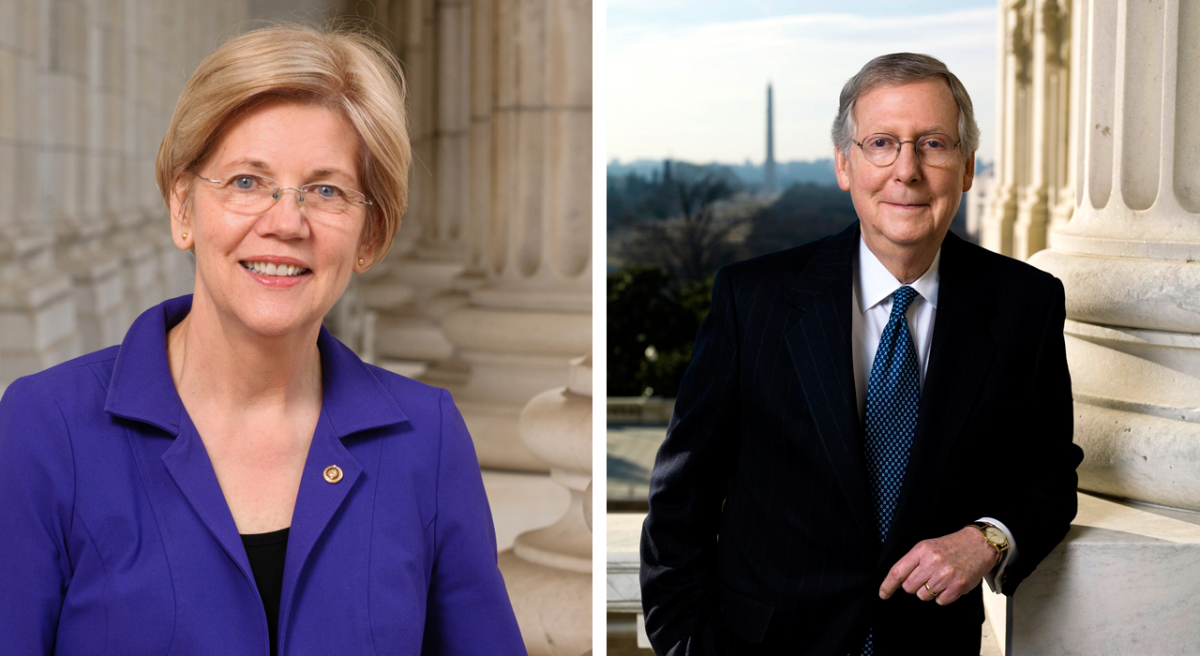
Disciplining the Unruly Woman: Elizabeth Warren’s Rebuke and the Rhetorical Performance of Male Authority
By Karrin Vasby Anderson, Ph.D.
When Senate Republicans voted to rebuke Sen. Elizabeth Warren for reading excerpts of a letter penned by Coretta Scott King during a speech opposing Sen. Jeff Sessions’ confirmation as U.S. Attorney General, pundits blanched at the “extraordinarily rare” invocation of an “arcane and seldom invoked provision in the rules of the Senate.” According to the Washington Post, Senate Rule 19 ’s proscription against impugning a fellow senator was aimed at deterring the sorts of personal attacks that spawned a fistfight in the Senate chambers in 1902. Critics of the Warren rebuke have rightly noted the racist and sexist underpinnings of parliamentary procedures passed in the interest of decorum but invoked to maintain White male privilege. Indeed, the Republican majority that rebuked and silenced Warren allowed four other Democratic senators to quote from the same letter Warren had read.

CNN’s Eric Bradner was perplexed by the rebuke, noting that the action turned “what could have been an ordinary late-night partisan floor speech for political devotees into a national story” that “immediately galvanized the Democratic base.” The Warren rebuke was weaponized in the Twittersphere after Senate Majority Leader Mitch McConnell defended his party’s action by stating that Warren “had appeared to violate the rule. She was warned. She was given an explanation. Nevertheless, she persisted.” “Nevertheless, she persisted” and “#LetLizSpeak” quickly went viral.
The Washington Post reported that Warren’s "supporters immediately seized upon McConnell’s line—giving Warren a far bigger megaphone than if they had simply let her continue speaking in what had been a mostly empty chamber...."
Similarly, Doyle McManus of the Los Angeles Times called McConnell’s move a “blunder” that “backfired—badly.”

As a scholar who researches gender and political leadership, I see McConnell’s statement—and Warren’s rebuke more broadly—not as a gaffe, but as an intentional, strategic performance of White male political authority. In Governing Codes: Gender, Metaphor, and Political Identity, Kristina Horn Sheeler and I examine the ways in which the identities of political women are shaped by archetypes of female identity. One of the most potent is the “Unruly Woman” persona, exemplified by former Texas Governor Ann Richards and echoed by the thousands of women who demonstrated against the Trump presidency on January 21, 2017, wielding signs with slogans such as “Pussy Grabs Back” and “We are the granddaughters of the witches you weren’t able to burn.” Unruly political women defy traditional norms of femininity and decorum, asserting their political dominance by creating spectacles of themselves. They often exist outside the boundaries of traditional feminine appeal due to their age, race, sexuality, body type, or political predilections.
Warren’s reputation as a progressive iconoclast makes her the most visible unruly political woman of the Trump era, and when she attempted to use her position of privilege to enter Coretta Scott King’s objections to Sessions’ racist actions into the official record, she doubled down on her unruliness, forging an intersectional coalition that threatens to upend the White male privilege that underlies the U.S. presidency and the Republican congressional majority.
McConnell’s statement, then, was far from a late-night gaffe. It was a continuation of Trump’s campaign strategy in which White masculinity must be perpetually performed in order to reassure constituents who are troubled by unruly women (and Black presidents). One effect of Trump’s election has been that reactionary rhetorical performances of male authority have retaken center stage. The Los Angeles Times speculated that there was a “practical reason McConnell told Warren to shut up and sit down: It was a gesture of loyalty toward Sessions,” who “will be one of McConnell’s main conduits to the White House.”
She was warned.
She was given an explanation.
Nevertheless, she persisted.
The short-term silencing of Warren that was a result of the Republican majority’s institutional power serves as sign of Republicans’ long-term fidelity to the norms of White masculinity that dominate political culture. If women turn McConnell’s words into a meme—all the better. It reminds his supporters of the unruly power that must be constrained.
Of course, unruly political performances don’t simply subordinate women to privileged male adversaries. The unintended consequence of McConnell’s statement and Trump’s agenda, more broadly, has been to forge a progressive political coalition. Warren and her male senatorial allies reached across racial divides and back into history so that Coretta Scott King could testify against Sessions. In so doing, they constituted a collective, transhistorical identity that was similarly performed by participants of the worldwide women’s marches of 2017.
This rebuff of one unruly political woman will not be an isolated occurrence. Because of their gender, all women who seek political authority—particularly those who attempt to wield or curtail presidential power—are deemed unruly. They make many people uncomfortable—even people who might otherwise agree with women candidates’ political stances. Resistive rhetorical performances sometimes violate the rules. They incur warnings. They defy explanations. Nevertheless, they will persist.
References
- Anderson, Karrin Vasby and Kristina Horn Sheeler. Governing Codes: Gender, Metaphor, and Political Identity. Lanham, MD: Lexington Books, 2005.
- Campbell, Karlyn Kohrs. “The Discursive Performance of Femininity: Hating Hillary.” Rhetoric & Public Affairs 1 (1998): 1-19.
- Jamieson, Kathleen Hall. Beyond the Double Bind: Women and Leadership. New York, NY: Oxford University Press, 1995.
- Parry-Giles, Shawn J. Hillary Clinton in the News: Gender and Authenticity in American Politics. Champaign, IL: University of Illinois Press, 2014.
- Sheeler, Kristina Horn and Karrin Vasby Anderson. Woman President: Confronting Postfeminist Political Culture. College Station, TX: Texas A&M University Press, 2013.
Online Resources
- Center for American Women and Politics
- Pew Research Center on Women and Leadership
- Barbara Lee Family Foundation’s Women in Politics Program
- Carrie Chapman Catt Center for Women and Politics
- Women’s Media Center


